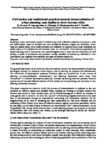| dc.creator | Serraos, Konstantinos | en |
| dc.creator | Asprogerakas, Evangelos | en |
| dc.creator | Chazapis, Antonis | en |
| dc.creator | Gkoumopoulou, Georgia | en |
| dc.date.accessioned | 2023-11-30T22:27:06Z | |
| dc.date.available | 2023-11-30T22:27:06Z | |
| dc.date.issued | 2018 | |
| dc.identifier.uri | http://hdl.handle.net/11615/83178 | |
| dc.description.abstract | Social and urban movements, citizens' initiatives and their collective reactions co-produce a wide and differentiated space of multiple and even conflictual features, origins and intentions, where local and global issues, from social cohesion and solidarity at neighbourhood scale reclaiming the public space or the implications of economic crisis, are intertwined. Contemporary approaches on spatial planning tend to incorporate new methodological tools to cope with the movements of civil society, a series of procedures and practices usually described as bottom-up, informal or non-institutional, that originate from multiple synergies of distinct trajectories. | en |
| dc.language.iso | en | en |
| dc.source | “Changing Cities: Spatial, Design, Landscape & Socio-economic Dimensions”, Department of Planning & Regional Development, School of Engineering, University of Thessaly, Syros Islands, Greece, 26-30 June, Greece | el |
| dc.subject | Civil society | en |
| dc.subject | Democratization of planning | en |
| dc.subject | Institutional/participatory planning | en |
| dc.subject | German cities | en |
| dc.title | Civil society and institutional practices towards democratization of urban planning: case studies on three German cities | en |
| dc.type | conferenceItem | en |


